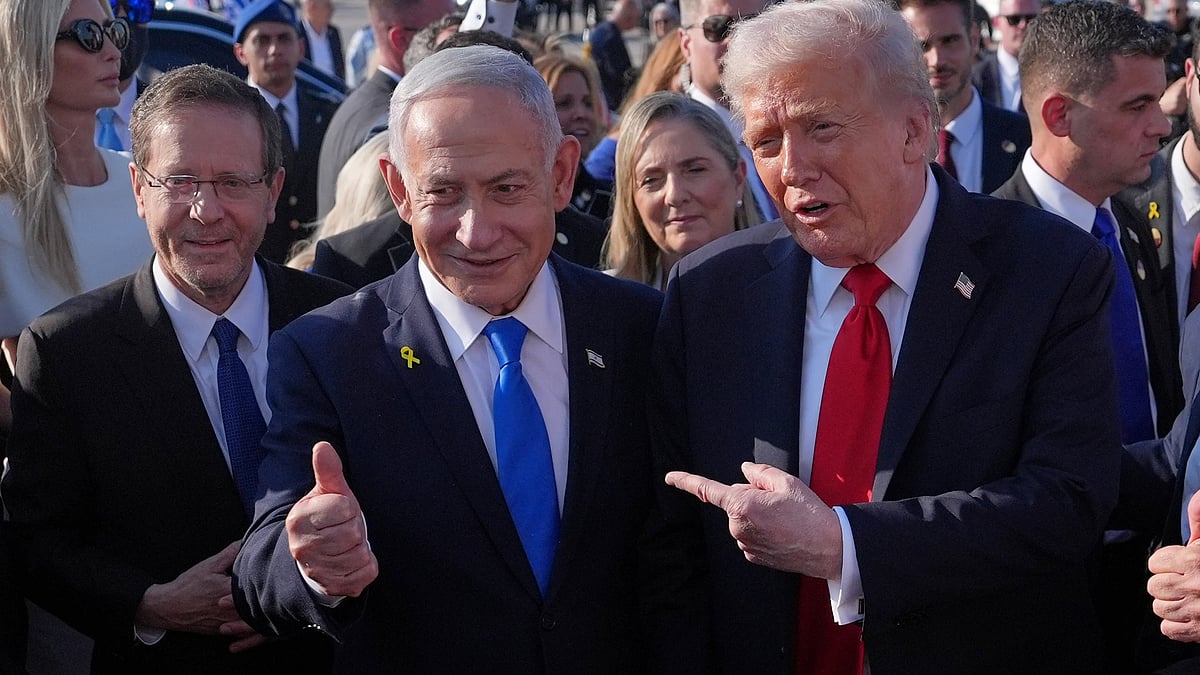World
India is a great country with good friend of mine at top, says Donald Trump
Earlier, US president also praised Sharif and Pakistan’s army chief Gen Asim Munir, calling him his “favourite field marshal”

In a characteristically dramatic flourish on the global stage, former US President Donald Trump on Monday, 13 October, lavished praise on India and its leadership — without explicitly naming Prime Minister Narendra Modi — describing India as “a great country with a very good friend of mine at the top.”
Addressing an extraordinary summit of world leaders in Egypt convened in the wake of the ceasefire that ended the Israel–Hamas war, Trump appeared buoyant as he declared from the podium, “I think India and Pakistan will live very nicely together.” His words, delivered with an air of triumph, were accompanied by a nod toward Pakistan Prime Minister Shehbaz Sharif, who responded with a polite chuckle as cameras flashed across the hall.
“India is a great country,” Trump reiterated, “and my good friend there has done a fantastic job”. The compliment, though indirect, was unmistakably aimed at Prime Minister Modi — a leader with whom Trump has long boasted of a warm rapport, forged during his presidency and showcased most memorably during the 2020 “Namaste Trump” event in Ahmedabad.
Moments earlier, Trump had also extended cordial praise to Sharif and Pakistan’s powerful army chief, general Asim Munir, referring to the general as his “favourite field marshal”. The former US president then invited Sharif to take the microphone and address the assembled dignitaries.
Published: undefined
In a carefully worded tribute, Sharif hailed Trump’s “untiring and relentless efforts” in brokering peace across the Middle East, calling the recent Gaza ceasefire a “monumental achievement.” He went a step further, revealing that Pakistan had earlier nominated Trump for the Nobel Peace Prize for his “extraordinary contribution” in ending hostilities between India and Pakistan and later bringing calm to the Middle East.
“President Trump saved millions of lives not only in South Asia but also in the Middle East,” Sharif said, adding with visible admiration, “and I would like to nominate him again for the Nobel Peace Prize.”
The remarks drew a wave of applause, as Trump smiled broadly, waving off the compliment with his trademark humility-meets-showmanship. “I didn’t do it for the Nobel,” he later told reporters, claiming he had “resolved eight wars,” including the most recent conflict between India and Pakistan.
Trump has long asserted that his behind-the-scenes diplomacy has brought peace to multiple regions — a list that, until recently, numbered seven. With the inclusion of the Israel–Gaza ceasefire, he has now raised that count to eight.
The former president has repeatedly claimed credit for what he calls the “Washington-mediated understanding” that brought an abrupt halt to the latest India–Pakistan confrontation — a claim New Delhi has firmly dismissed. Since May 10, when Trump first posted on social media that India and Pakistan had agreed to a “full and immediate ceasefire after a long night of talks,” he has reiterated the assertion dozens of times, casting himself as the peacemaker who “helped settle” the long-fraught equation between the nuclear-armed neighbours.
Published: undefined
However, official accounts from New Delhi paint a more measured picture. India maintains that the decision to cease hostilities was the outcome of direct talks between the Directors General of Military Operations (DGMOs) of the two countries, without any external mediation.
The ceasefire, announced on 10 May, followed a tense four-day exchange of drone and missile strikes across the border. The escalation began after India launched Operation Sindoor on 7 May, targeting terror infrastructure in Pakistan and Pakistan-occupied Kashmir in retaliation for the 22 April Pahalgam terror attack that killed 26 civilians.
By 10 May, following intense military exchanges and diplomatic back-channel efforts, both sides agreed to silence their guns. The truce has since held, though fragile, amid mutual claims of restraint and responsibility.
Trump’s remarks in Egypt once again thrust his self-fashioned image as a global dealmaker into the spotlight — an image that continues to animate his political persona as he eyes a return to the White House.
For South Asia, his comments — part praise, part provocation — rekindled memories of his earlier attempts at mediation between India and Pakistan, which New Delhi had consistently rebuffed. Yet, in a hall filled with world leaders and television cameras, Trump’s words seemed aimed less at diplomacy and more at legacy: a former president determined to script himself into the history books as the man who “ended wars” and made old rivals “live nicely together.”
With PTI inputs
Published: undefined
Follow us on: Facebook, Twitter, Google News, Instagram
Join our official telegram channel (@nationalherald) and stay updated with the latest headlines
Published: undefined